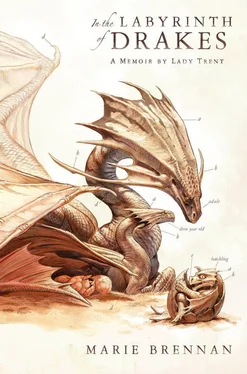“Looks like it was bashed in,” Andrew said.
The four of us were crouched on the steps above, leaning over one another to study the scene. Suhail traced one hand through the air, not touching the wood. “Struck here, I think—and it broke the panel near the top, tearing away a portion still attached to the hinge. That must have rotted away entirely.”
Tom broke the silence that followed. “What was in here, that it merited breaking down the door?”
Was. Whatever had been here was undoubtedly long gone. But I knew Suhail’s views on archaeology: even if the great treasures had been looted, we might still learn any number of things from the shreds that remained.
Suhail eased the cover of a notebook beneath one of the pieces of wood and tried to lift it. The fragment crumbled as he did so. “Damn,” he said. “We can’t possibly carry this back. It won’t even survive going up the staircase.” He turned, putting one hand on my knee. “My artistic, keen-eyed love, my angel of the pencil. Can you record it?”
Imagine, if you will, that you are sitting at the entrance to a previously unidentified Draconean ruin. Any number of wonders may lie down the dark stone corridor that stretches before you… but you are not exploring them, because you have undertaken to draw a picture of a broken, half-rotted door. Not just the door, either: also its hinges, and the green, corroded mass that was once the latch, and the shape of the frame and staircase that accompany it.
It is a mark of how much I love Suhail and esteem his archaeological acumen that I did as he asked, rather than trampling across the decaying wood of the door to see what lay beyond.
When that was complete, we removed what we could of the door, which in the long run was only its metal fittings. These we wrapped in scraps of cloth, and then—at last—we proceeded.
Four of us went: Haidar and al-Jelidah remained outside with the camels. Suhail took the lead, but I followed with my hand in his, one step behind only because we could not comfortably walk side by side. He and Andrew carried lamps, and their light showed us that the tunnel, hewn out of solid stone, was carved all along its length: the striding figures of Draconean gods, winged and dragon-headed, with humans bearing offerings to them. “If you ask me to stop and draw all of these before we explore to the corridor’s end, I shall kick you,” I whispered to Suhail. He laughed.
(Why did I whisper? It was not as if there were anything down there I might disturb by speaking too loudly. But I could not have raised my voice for all the iron in Eriga.)
Then Suhail stopped, so abruptly that I ran into his back.
He was not looking at the walls any longer. I followed the line of his gaze, and saw something on the floor up ahead.
Andrew, peering around me, said, “Is that… are those bones ?”
It will not surprise you, I expect, that I thought immediately of dragonbone. There is no evidence the Draconeans had the art of preserving them, and good reason to believe they did not, apart from what nature may have occasionally provided; the chemical knowledge necessary for that is rather more advanced than they likely had. But the last time I discovered a pile of bones in an underground space, they had come from dragons.
These, however, were human. We advanced slowly, as if the skeleton might rise up and attack us; Suhail held his lamp out like a shield. The four of us clustered together instinctively, courtesy of too many lurid tales of haunted Draconean temples.
Up close, however, the bones were merely sad. They lay as their owner had fallen, slumped against the wall—and to my great surprise, they were not entirely bare. Water had not penetrated this far, and so the body had naturally mummified in the cool, dry air. The preservation was imperfect, and his clothes hung in nearly absent tatters… but one could look at his cadaverous face and see an ancient person there.
“He’s got a knife,” Andrew murmured.
We arrayed ourselves around the body, touching nothing. Andrew was right: there was a dusty bronze blade under the corpse’s hand, as if he had dropped it when he died. Tom lowered his face nearly to the floor, peering at the body, and said, “There’s something caught between his ribs. It might be the point of a spear.”
“A broken door, and now a dead man,” I said. “What happened here?”
His voice trembling faintly, Suhail said, “Isabella, I will ask you to draw him. And, yes, the carvings on the walls. But not yet.” Even his scholarly discipline knew limits.
We went onward. Now that we knew to look for them, we spotted dark marks on the floor, on the carvings along the walls, that might have been bloodstains. Then the corridor came to an end at another door, and this one was not broken down; it stood a little ajar.
My heart felt as if it might leap right out of my mouth. Suhail looked back at us. I do not know what Tom and Andrew did, but I nodded emphatically. He removed his headscarf, wrapping his hand in the fabric—he later explained this was to keep the oil and sweat of his hand from touching the wood, made delicate by the ages—and eased the door open far enough for us to slip through.
The room beyond was as you have seen it in pictures: a rectangular space, its corners dominated by four statues standing with wings and arms outspread. The spaces in between were carved and painted, their colours undimmed by time, for they had not seen light since the downfall of Draconean civilization. Those murals alone would have made the site a worldwide treasure, for they are better preserved than any we have found elsewhere, and from them we have gleaned a hundred details of the ancient Draconean religion.
The remaining contents were few, with signs that the place had been looted long before we set foot inside. A bronze tripod had once stood in the center of the room. Now it lay on its side a little distance away, the bowl fallen from its top, dented and forlorn. By the left-hand wall there was a splintered pile of wood, with shards of clay beneath; these proved to be tablets, each carved with Draconean text, which we have since pieced back together. Chains hanging from the ceiling still held primitive lamps: shallow bronze dishes that would have been filled with oil, judging by the soot that marked the ceiling above.
One of those lamps had been torn from its moorings. Below its empty chains lay two more bodies, as well preserved as their companion out in the corridor. It took no careful observation to see how one had died: his head was crushed from the side. The other we could not judge, for he lay under the first, and no one wanted to move him.
Andrew muttered a profane oath, looking at the two of them. “So the myths are true. The Draconeans didn’t just fall—they were overthrown.”
Common sense argued that a few dead men did not a rebellion make. My instinct, however, agreed with Andrew. Those men had not died of natural causes; they were killed in a fight. Given the state of preservation here, that must have happened in ancient times, with sand sealing the place for millennia afterward. Their weapons, from what we could see of them without touching the bodies, were crude bronze: assuredly not the best Draconean civilization could produce, and not what defenders of this temple would have been armed with. They must be invaders, rebels, the ones who had kicked in the door and come down here to despoil this place. No other site in all the world preserved a moment like this one did, and the moment thus presented to us, out of the distant past, was one of war.
Suhail’s eyes were wide in the lamplight, drinking in every detail. The wonder I felt upon seeing a dragon in flight was written in the soft parting of his lips, the stillness of his body, as if the slightest movement would cause this all to collapse into dust and dreams. He and I had found a Draconean site before, on Rahuahane, but that one had been wrecked like all the others. This one was almost pristine, and I could only begin to imagine the effect it had on him.
Читать дальше












